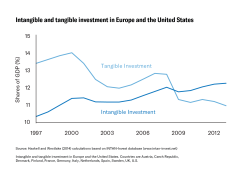In a rapidly changing world, so-called “intangibles” are playing an increasingly important role for investors. Intangibles are assets, such as good will, brand recognition, and intellectual property, that are not physical in nature. This also includes software technology that powers internet giants such as Facebook and Google, as well as the operating procedures of Starbucks and the value of the Coca-Cola brand.
Artificial (or augmented) intelligence and the associated value extracted from Big Data are important intangibles which must be analyzed and assessed when valuing equities. While these analytical tools are commonly exploited to grow revenue and profitability of the major technology disruptors, the usage of data analytics is now spreading to the more conventional players, including financial service providers, with a view to also enhancing shareholder returns.
Companies focusing on intangibles tend to have capital-light business models. Their output is often highly scalable, facilitating massive growth in their networks without a corresponding surge in input costs. As discussed during last year’s Forum, this has coincided with growing concentration within sectors well beyond technology and, ironically, a decline in dynamism. This has in turn led to a rising share of profits at the expense of labor. Political forces such as regulation, rather than economic pressures, may ultimately contain concentration but, for now, these are arguably operating in reverse, at least in the U.S.

The trend towards increasing concentration and more monopolistic power with corporates is likely to persist and may increase through time. As a result, profit margins are likely to be sustained at historically high levels even if there is an economic downturn in coming years. Indeed, the next recession may consolidate the position of dominant firms in some sectors. The future winners are therefore likely to be the owners and providers of capital.
For the investment professionals at BMO Global Asset Management, the goal is to identify those winners – businesses that have sustainable competitive advantages.
Read more from BMO’s Global Investment Forum at bmogamviewpoints.com or listen to the podcast episode at bmogam.com/betterconversations.
Past performance is not necessarily a guide to future performance. Information has been obtained from sources we consider to be reliable, but we cannot guarantee the accuracy. This material does not constitute investment advice and is not intended as an endorsement of any specific investment.
BMO Global Asset Management is the brand name for various affiliated entities of BMO Financial Group that provide investment management and trust and custody services. Certain of the products and services offered under the brand name BMO Global Asset Management are designed specifically for various categories of investors in a number of different countries and regions and may not be available to all investors. Products and services are only offered to such investors in those countries and regions in accordance with applicable laws and regulations. BMO Financial Group is a service mark of Bank of Montreal (BMO).
© 2018 BMO Global Asset Management. (7814286, 11/18)
Investment products are: NOT A DEPOSIT — NOT FDIC INSURED — NOT BANK GUARANTEED — MAY LOSE VALUE.






